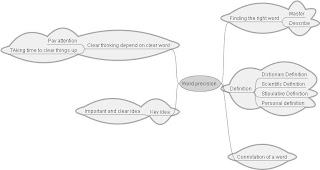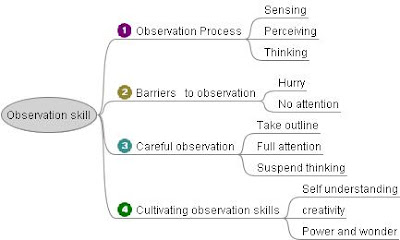
Saturday, March 15, 2008
TFY chapter 6

TFY Chapter5

TFY chapter 4

You will understand how observation helps determine facts imagination and reasoning to link the fact with explanation and how generalization ties all this information together into meaningful whole.Inference also can be use in addition as a strategy in planning and choosing alternative when it comes to solving problems.
TFY Chapter 3

It is not easy for us to determine whether facts correspond to reality. This can only be determined over time with repeated feedback and testing.
The difference between facts and fiction does matter.
Feelings are facts; they can distort or enhance our perceptions, depending on how conscious we are of their presence.
Facts are not absolutes but statements of probability. Because we are dependent on confirmation from others in our search for facts, social pressures can lead us to distrust or distort our own perceptions.
Fact must be expressed in carefully formulated statements that have the following characteristics:
-They define their own limitations.
-They are objectively stated.
-They use appropriate qualifiers.
-They state the obvious.
-They are not inappropriately cautious.
-They do not include guesses or inferences.
-They are specific and offer their
Discovery Exercises p.75- Facts: What Real?
Know: be cognizant or aware of a fact or a specific piece of information; possess knowledge or information about; know how to do or perform something.
Certain: certain(a): definite but not specified or identified;
certain(p): having or feeling no doubt or uncertainty;
certain(p): established beyond doubt or question; definitely known.
Verified: corroborated: supported or established by evidence or proof.
Existence: being: the state or fact of existing; is an ontological topic par excellence.
Real: being or occurring in fact or actuality; having verified existence; not illusory.
Fact: a piece of information about circumstances that exist or events that have occurred.
Tuesday, March 11, 2008
TFY Chapter 2

1.When Frederick Douglass grasped the concept of abolition,he understood it was possible for him to become free.False
2.Words can be used to do a better or worse job of describing experiences but can never be more than transltions of the experiences themselves.False
3.A dictionary can help us think better when we use it to clear up word confusion.True
4.Definition of a word show the word's boundaries.True
5.Knowing the words for things helps us see them better.True
6.We donot fully understand a word unless we can define it.True
7.When people debate a tropic,understanding is greatly helped by their taking the time to define the key termsTrue
8.Etymology gives us word histories.True
9.Pocket dictionaries are sufficient guides for a critical study of word meanings.False
10.The word ohm comes from the sanskrit language and means the sound of creation.True
11.According to most dictionaries,there is more than one acceptable spelling of the word cooperate.True
12.The term French leave means to say good-bye with a big kiss.False
13.The prefex in in the words insignificant and inflammable means not in latin.True
14.The following words all contain the sound calle aschwa;mass,polite,placement,bogus,visible.False
15.The word nausea can be pronounced atleast three different ways.False
16.The word round can function as six different parts of speech;adjective,noun,transitive and intransitive verb,adverb,and preposition.False
17.Egregious comes from a latin word meaning standing out from the herd.True
18.The word nadir in the phrase "the nadir of politics" means the highest point.False
19.A cogent argument is a convincing one.True
20.The word decimate means to dice something up into pieces.True
TFY chapter1

1 Observation skills are learned mainly through book learning. Support for Answers. On the contrary, observation is learned from participation, which is more active and spontaneous than reading. Samuel Scudder learned observing through the active coaching of his teacher Agassiz as well as from his own efforts, curiosity, and persistence in studying his fish. False
2. The standard academic study of all the physical sciences requires observation skills, whether in the field or laboratory. False
3. In thinking, the correctness of our conclusions usually depends on the clarity of our perceptions. True
4. Observation skills can be extended to observing how you observe. True
5. An insight is an experience of understanding that can occur spontaneously after we observe something intently for a while. One illustration of this experience is the story of Archimedes, who, while in his bath, discovered the means of measuring the value of an irregular solid by the displacement of water. True
6. Agassiz was simply too busy to give his student all the assistance he needed. False
7. Perception and sensation are synonyms. True
8. It is difficult to feel sensation and to think at the same time. If we want to feel whether a pair of new shoes fits properly, we have to pay attention. True
9. Assimilation, according to Piaget, is an experience of easily understanding something that readily fits into our preexisting schemes or world view. True
10. The word thinking, according to the dictionary, has only one meaning.False